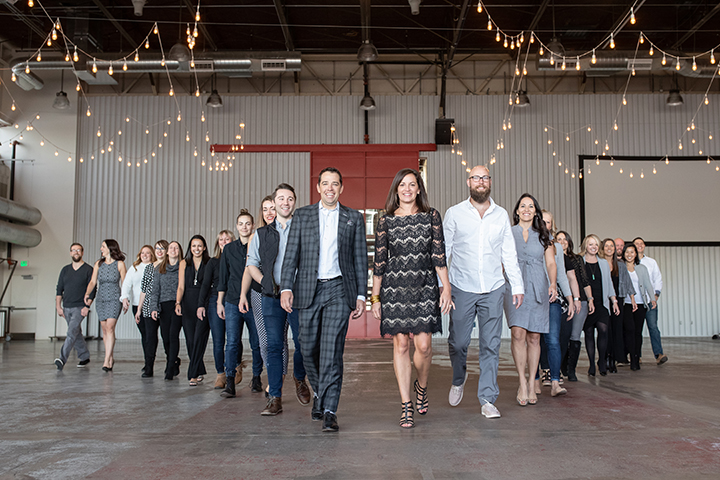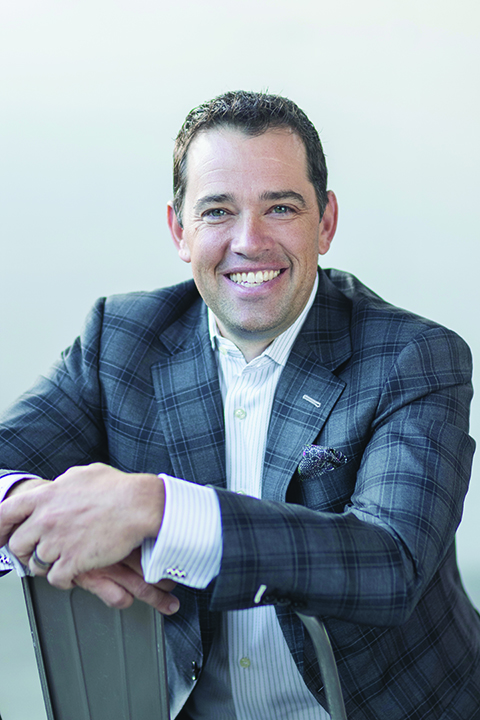Anthony Lambatos and his wife, April (front and center in the opening photo) are the brains behind Footers Catering in Denver, CO, which was started in 1981 by Anthony’s father, Jimmy, and purchased by Anthony and April in 2010. Though the years, Footers has weathered every staffing storm in the industry by emphasizing a team-first culture, minimizing turnover in the process.

Anthony (left) and April (right) and their Footers team. Photo courtesy Footers catering
That stability has helped grow the business into a powerhouse, with 40 full-time employees and more than 100 part-time staff, catering 600 events and feeding 75,000 people annually.
Anthony and April are featured speakers at Catersource 2020, focusing on staffing and leadership strategies. We sat down with Anthony for a preview of his sessions, and for tips on surviving the current crunch for labor.
Q: Why do restaurants seem to have an advantage over catering when competing for the same talent?
Lambatos: Because the catering industry isn’t promoting itself as well as restaurants. Celebrity chefs and restaurants are promoted constantly in our culture, especially in social media and on TV, so they’re seen as sexy jobs. I think there’s a misperception that catering isn’t as exciting, and it’s because people don’t know all the possibilities.
When I look at catering, I see five career paths: F&B, planning events, operations and management, finance, and warehouse/inventory logistics. One of the advantages we have over restaurants is we get to do something different every day. We’re not serving the same menu at the same place all the time.
Q: How has the gig economy affected the labor pool for catering?
Lambatos: People have more options today because of app-based businesses. They can use their cars to rideshare, or they can deliver food, and technology has made it easy for them to make some extra money. I think that competition will continue to be a problem for caterers.
Q: How has Footers adapted to the current labor shortage?
Lambatos: We increased our leadership positions from 15 to 24, and restructured to six different levels of employment, up from three. That helped us keep people who may have worked here for a year, and perhaps felt stuck in their position because there wasn’t room for advancement. Now they have incentive to stay and grow their careers with us.
Word of mouth has also helped us recruit new staff because we put so much emphasis on being a great place to work, so our employees tell their friends to apply with us. Consequently, we haven’t been hit by the staffing crunch as hard as some of our competitors.
Q: What programs do you have at Footers that incentivize staff and reduce turnover?
Lambatos: We have a culture club, which isn’t just a party-planning committee, but a fun way to recognize our talent and encourage mutual respect for our team members. We also have a tiered vacation policy based on a person’s level of employment and time working at Footers, which includes anniversary trips every five years for a culinary learning experience in places like Tahiti, Greece, Alaska, and the Caribbean.
Also, every year our team picks a vacation spot, and this year we have 40 people going to Playa Del Carmen for four nights at an all-inclusive resort. It started five years ago when some of our staff asked us to organize a vacation for them, so we found a great deal and subsidized a portion of it. We had 20 people sign up and it was a hit, so now it’s an annual tradition. These trips help them get to know each other, which means they’re more patient with each other when the job gets tough.
Q: What can attendees of Catersource 2020 expect from your sessions?
Lambatos: April and I will have a detailed session about heart leadership, and how to lead staff in a way where they don’t get burned out or discouraged but continue to be motivated and excited to do their best.
Here’s an example: We had a server once who couldn’t keep up filling water glasses because it was so hot. He said, “I just keep filling these water glasses and they just keep drinking it. It’s so frustrating.” I explained that his job was not to fill water glasses, but to create an exceptional experience for our client. He got it, and it changed his approach to the task.
I’ll also have a Candid Conversation session about MIBE, which is an acronym for Make It Better Everyday and is part of our mission statement. MIBE is about intentional culture building in the hospitality industry, and we’ll explain how MIBE principles can help create a great place to work, and make staff feel like their jobs are unique, which in turn skyrockets their productivity.
See Anthony Lambatos at Catersource 2020!

Presenting:
7 Numbers Every Caterer Should Know
A Candid Conversation LIVE with Anthony Lambatos
Heart Leadership, with April Lambatos
The Innovation Quotient Edge
Maximizing Your Catering Profits, with Lon Lane, Chef Adam Gooch, and Clint Elkins
Go to schedule.catersource.com for additional information, such as date and time.




